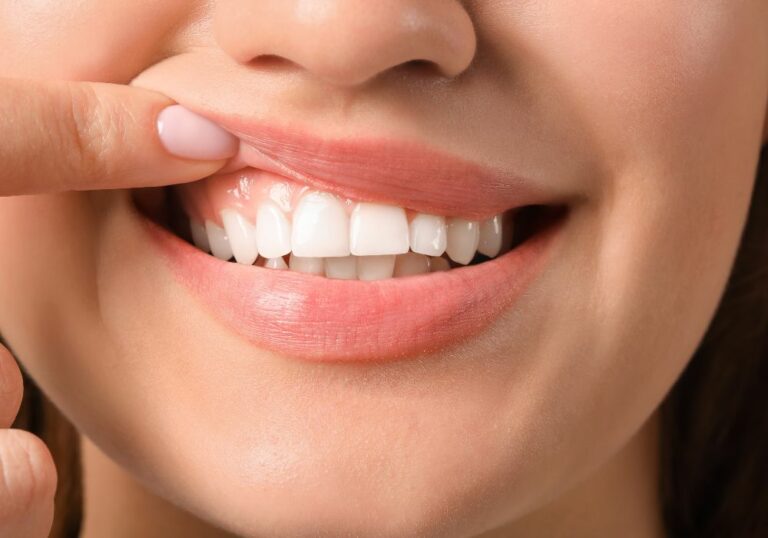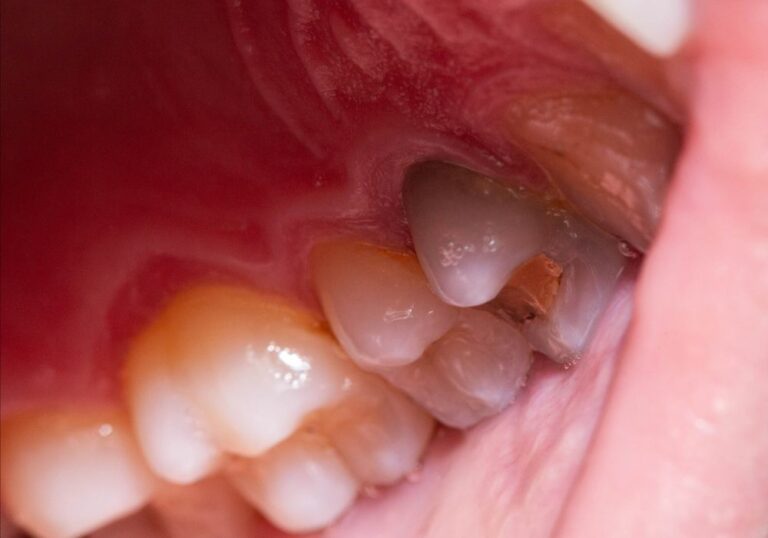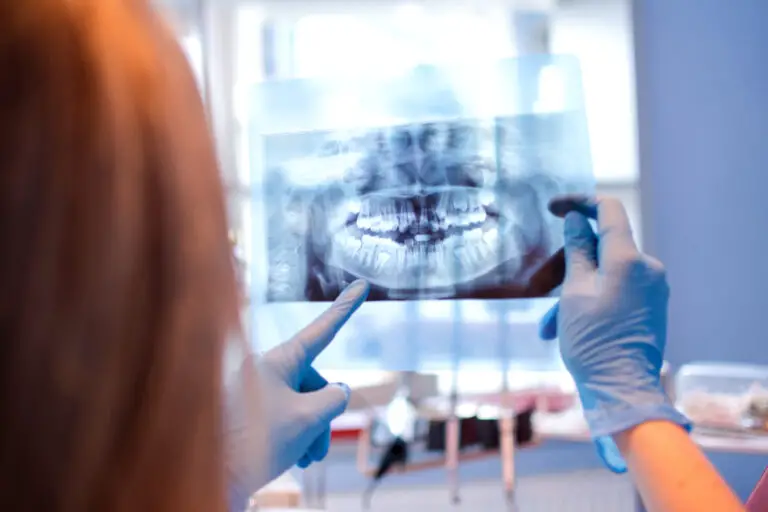Wisdom teeth, also known as third molars, are the last set of molars to erupt in the mouth typically between the ages of 17 and 25. For some people, wisdom teeth can emerge properly and cause no problems. But for many others, wisdom teeth do not have enough room to erupt fully or emerge in the proper alignment. This can lead to a range of problems, including jaw issues.
How wisdom teeth can impact the jaw

There are a few ways that wisdom teeth may negatively affect the jaw:
Crowding other teeth
If wisdom teeth come in crooked or at an angle, they can push up against and damage nearby teeth. The pressure exerted can even damage the roots of neighboring teeth.
Putting pressure on jaw joints
Misaligned wisdom teeth can put extra strain and pressure on the temporomandibular joints (TMJs), which connect the jawbone to the skull. This can lead to pain, inflammation, and TMJ disorders.
Causing cysts or tumors
Fluid-filled sacs called cysts can form around impacted wisdom teeth. Cysts expand over time and destroy surrounding bone and teeth. Wisdom teeth remnants left in the jaw can also lead to cysts or even tumors, also destroying bone.
Worsening existing jaw issues
For those with pre-existing jaw joint problems, misaligned wisdom teeth can exacerbate issues like temporomandibular joint dysfunction (TMD/TMJ) and worsen pain and inflammation.
Signs wisdom teeth are causing jaw problems
Some signs and symptoms that may indicate wisdom teeth are negatively impacting the jaw include:
- Jaw, mouth, or tooth pain that increases over time
- Jaw stiffness, difficulty opening the mouth, or locked jaw
- Popping, clicking, or grinding sounds in the jaw joints
- Swelling, tenderness, or discomfort around the jaw, cheeks, or neck
- Headaches or earaches
- Teeth that shift position or become painful when biting or chewing
- Bad breath or unpleasant taste in the mouth that persists
- Numbness or tingling of the lips, mouth, or tongue
Any persistent jaw or tooth pain, especially when chewing or opening the mouth, warrants an oral exam. An orthodontist or oral surgeon can take x-rays and determine if wisdom teeth are to blame.
Why wisdom teeth commonly cause problems
There are two key reasons why wisdom teeth often emerge improperly and cause problems:
Insufficient space
Modern human jaws have become too small to accommodate the four wisdom teeth. During evolution, jaw size has decreased while wisdom teeth size has not changed much. This lack of sufficient space means wisdom teeth become impacted and cannot fully emerge.
Wrong position
Wisdom teeth are the last to develop, right at the back corners of the jaw. If the jawbone is not wide enough or the teeth form at an angle, wisdom teeth can come in crooked, overlapping other teeth, or pointed sideways or backwards.
Complications that can occur

Left untreated, problematic wisdom teeth can lead to several serious oral health issues:
- Infection – Pericoronitis is an infection of the gum tissue around an impacted wisdom tooth. Infection and swelling can spread to other areas like the cheeks, jaw, and throat.
- Tooth decay – Impacted wisdom teeth are hard to clean and prone to plaque buildup and tooth decay. Cavities may form and worsen without treatment.
- Cysts/tumors – Fluid-filled cysts are common with impacted wisdom teeth. Tumors like ameloblastoma can also form from wisdom tooth remnants. Both destroy healthy bone and tissue.
- Tooth damage – The pressure exerted from impacted wisdom teeth can damage nearby teeth. Cracks in the enamel and roots of adjacent teeth may eventually require repair or extraction.
- Root resorption – In some cases, the roots of wisdom teeth may start to “dissolve” or resorb the roots of the second molars next to them. This can lead to tooth loss.
- Bone loss – Impacted wisdom teeth can destroy jawbone over time. This worsens any existing jaw problems and causes further misalignment.
- TMD/TMJ disorders – Ongoing pressure from wisdom teeth can lead to jaw pain, clicking/popping of the jaw joint, limited motion, and related TMJ issues.
When wisdom teeth removal is necessary
If wisdom teeth are impacted, emerge at an angle, or cause overcrowding and related symptoms, removal is often recommended to prevent more severe complications and damage. Wisdom tooth extraction may be a wise choice if they are:
- Partially erupted and trapped below the gumline
- Pushing against or overlapping adjacent teeth
- Causing gum swelling, infections, or cysts
- Causing decay in nearby teeth
- Damaging roots of other teeth
- Causing persistent pain or discomfort
- Worsening TMJ/TMD disorders
Removal is also advised if x-rays and a dental exam reveal lack of room for wisdom teeth to emerge properly. Orthodontists or oral surgeons can determine when extraction is the appropriate course of action.
Wisdom teeth removal procedures
Wisdom teeth extraction is performed by an oral surgeon. The details of the procedure vary on a case by case basis.
- Simple extraction – Removal of an erupted wisdom tooth. Can be done with local anesthetic.
- Surgical extraction – Removal of an impacted or unerupted wisdom tooth. Done under sedation or general anesthesia. May require cutting into bone or removing bone.
- Sectioning – An impacted tooth is cut into pieces and removed individually.
After extraction, patients may need stitches and must keep the site clean while healing. Antibiotics, pain medication, and mouth rinses are typically prescribed.
Recovering from wisdom tooth removal
Recovery from wisdom teeth extraction generally takes 7-10 days. Swelling, pain, and bruising around the surgery site are normal initially. These symptoms gradually improve over the first week.
Tips for proper recovery:
- Use ice packs on the face to minimize swelling
- Take prescribed pain medications as directed
- Rinse mouth gently with salt water to keep the area clean
- Eat soft foods like yogurt, applesauce, soup for a few days
- Avoid exercise, smoking, drinking through a straw, and other activities that disturb the extraction site
- See a dentist promptly if severe pain, bleeding, fever, or other issues persist
With diligent at-home care and follow-up with an oral surgeon, patients can expect a smooth recovery after wisdom tooth removal. This allows the jaw to start healing right away.
Can wisdom tooth extractions correct jaw problems?

For some patients, getting wisdom teeth removed can help alleviate existing issues with the jaw joint and function, such as:
- TMJ/TMD disorders – Removing impacted teeth may resolve discomfort, pain, and limited motion associated with temporomandibular joint dysfunction.
- Misalignment – Once wisdom teeth are extracted, adjacent teeth have room to shift gradually into better alignment, which can improve bite.
- Bone loss – Taking out wisdom teeth stops damage to the jaw bone and preserves bone density. This helps maintain the shape and integrity of the jawline.
However, wisdom tooth removal alone may not resolve all jaw problems. Additional treatments that work in conjunction include:
- Orthodontics – Braces or other appliances can properly align teeth after extractions. This also balances the bite.
- Bite splint – Also called a night guard. Worn temporarily or long-term to protect teeth from grinding, which stresses the jaw.
- Physical therapy – Stretches and exercises can strengthen jaw muscles and improve function after wisdom tooth removal.
- Surgery – Orthognathic procedures may be required to completely correct misalignments in jaw growth and bite.
Consulting an orthodontist or oral surgeon will help determine the best treatment plan. Ongoing care is key to restoring optimal jaw function.
Maintaining jaw health after wisdom tooth removal
Once wisdom teeth are extracted, a little prevention goes a long way in maintaining jaw health:
- Get routine dental cleanings and exams – Keeping teeth clean prevents problems like tooth decay and gum disease that could impact the jaw.
- Use good form when chewing – Chew evenly on both sides of the mouth to prevent straining one side of the jaw.
- Eat a balanced diet – Eating crunchy fruits and vegetables and fibrous foods can exercise jaw muscles.
- Manage bruxism – Clenching and grinding can be reduced with a mouth guard and stress relief techniques.
- Avoid gum chewing – Constant chewing can overwork the jaw muscles and joints.
- Quit smoking – Smoking increases the likelihood of periodontal disease which causes bone loss around teeth.
- Relax jaw muscles – Massage, warm compresses, and yoga can relax muscles that may be constricting the jaw.
Proper at-home care and working with your dentist will keep your jaw, teeth, and mouth in optimal shape after wisdom teeth are removed. Be sure to follow your oral surgeon’s specific postoperative recommendations.
Frequently Asked Questions
Can wisdom teeth cause TMJ?
Yes, wisdom teeth, especially impacted or misaligned ones, can cause or worsen temporomandibular joint dysfunction (TMJ/TMD). The pressure from wisdom teeth can damage the TMJ and surrounding tissue, leading to inflammation, pain, and impaired motion.
Should I have wisdom teeth removed if they don’t bother me?
Not necessarily. If wisdom teeth are fully emerged, aligned properly, and causing no symptoms, many dentists will monitor them instead of removing them proactively. However, partially erupted or impacted wisdom teeth often warrant extraction even if no pain is present yet to avoid future complications.
Can getting wisdom teeth out change your face?
In some cases, yes. Extracting wisdom teeth can alter your jawline and lead to changes in facial appearance over time. The bones and muscles may shift slightly without wisdom teeth present. In a small percentage of patients, the cheekbones and midface can appear more prominent.
How do I reduce jaw pain after wisdom tooth removal?
Using cold compresses, taking prescribed pain medication, eating soft foods, maintaining proper oral hygiene, and avoiding activities like exercising or drinking through a straw can help manage normal jaw pain after extractions. Contact your oral surgeon if severe pain persists beyond the first week of recovery.
When can I resume normal activity after wisdom teeth removal?
After having wisdom teeth extracted, take it easy for at least 3-4 days. Don’t exercise, play sports, or do anything too strenuous that could dislodge the blood clot and delay healing. After the first several days, you can resume light activity as tolerated but avoid intense exercise for 7-14 days.







